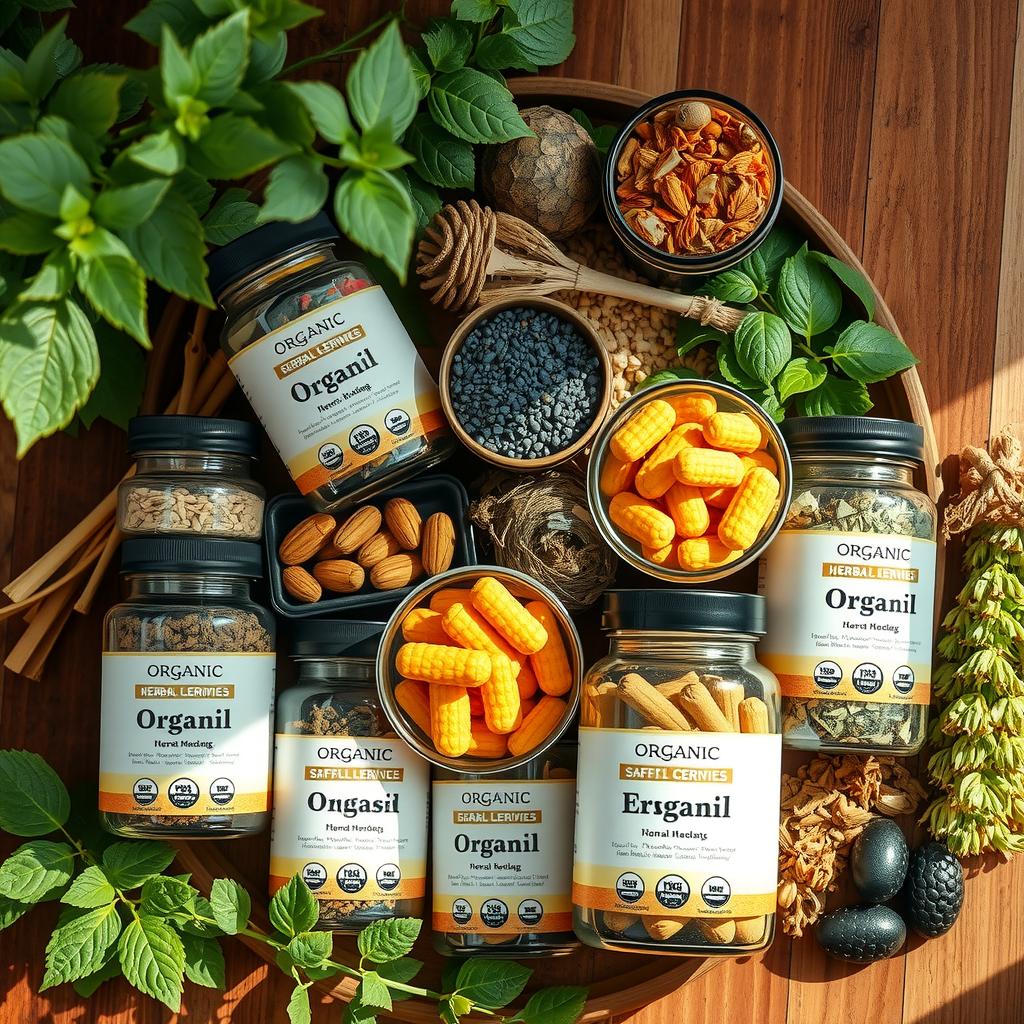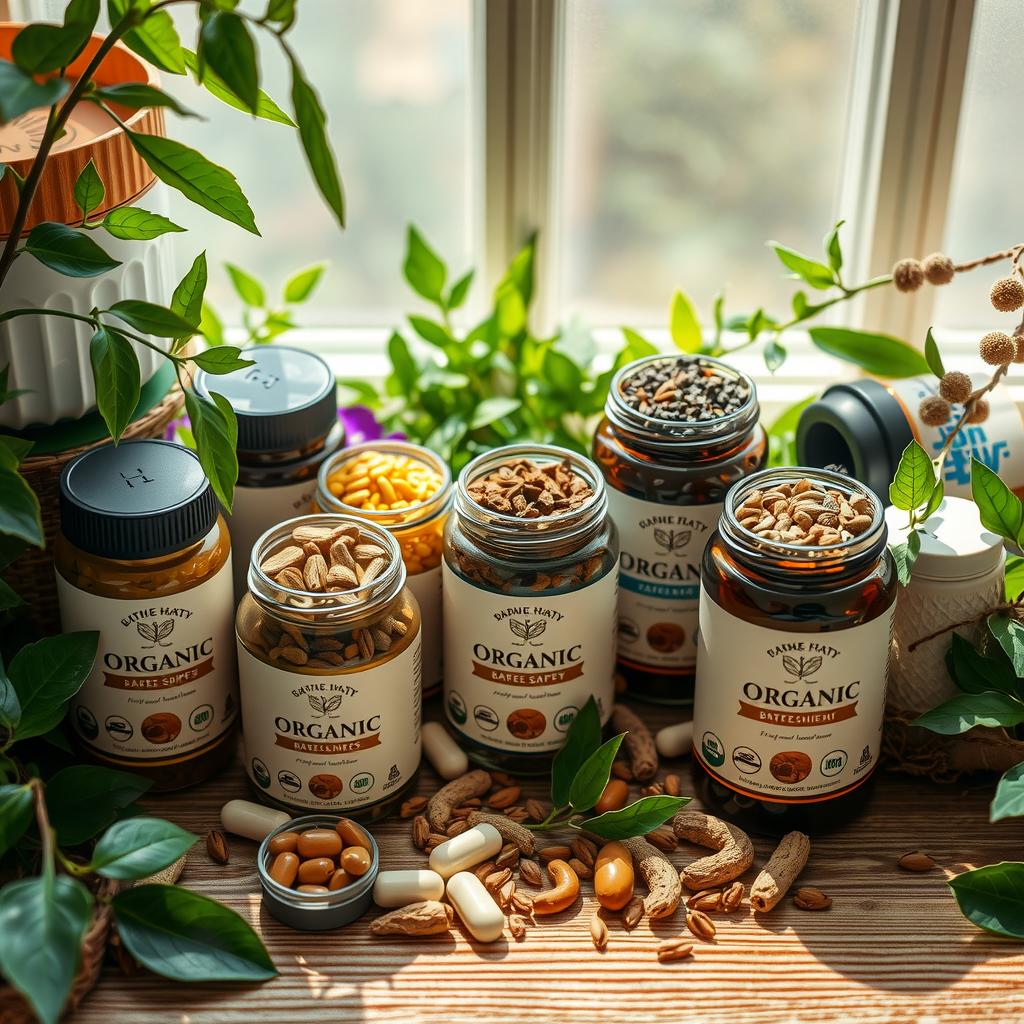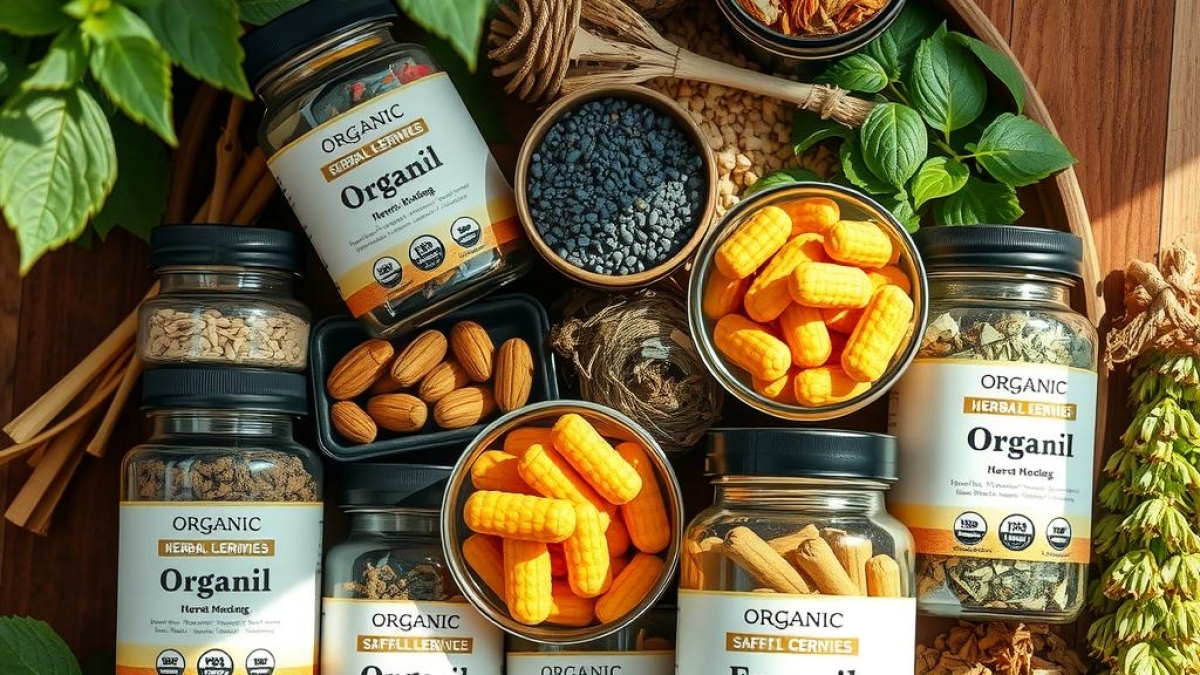In a world increasingly focused on holistic health and wellness, many consumers are turning to organic herbal supplements as a natural alternative for enhancing their well-being. However, with the rise in popularity of these products comes an essential question: How can individuals ensure that the herbal products they choose are safe, effective, and meet established standards? The answer lies in understanding the importance of safety certifications associated with these supplements. As more people seek out organic supplements, it becomes imperative to navigate through the myriad of options available while prioritizing quality assurance.
The core value of this article is to shed light on what constitutes proper supplement certification within the realm of organic herbal offerings. In recent years, concerns regarding herbal safety have escalated due to reports about contamination or mislabeling within dietary aids. This highlights a significant issue—while many may wish to embrace nature’s remedies, not all products undergo rigorous scrutiny before reaching store shelves. By delving into safety standards and organic certification processes for health supplements, readers will gain valuable insights into how they can make informed choices.
Understanding what makes an organic herbal supplement trustworthy involves examining various factors such as sourcing practices, manufacturing conditions, and third-party testing results. Certification from recognized organizations serves as a seal of approval that guarantees adherence to stringent guidelines designed for consumer protection. As we explore the nuances between reputable brands versus those lacking verification, readers will discover effective strategies for identifying high-quality options among countless herbal offerings.
Ultimately, this exploration serves not just as an informational resource but also as a guide towards making empowered decisions when purchasing herbal products. By being aware of potential pitfalls and recognizing credible certifications in place for ensuring product integrity—consumers can confidently enjoy the benefits offered by properly vetted organic options without compromising their health or values. As this article unfolds further details surrounding certification types and best practices in choosing safe alternatives—we invite you on this journey toward enhanced awareness about your favorite natural remedies!

Key Points:
-
Importance of Certification: Ensuring the Quality of Organic Herbal Supplements
In the realm of organic herbal supplements, certification serves as a crucial indicator of product quality and safety. A well-defined certification process assures consumers that these herbal products meet established safety standards. Recognized bodies verify compliance with rigorous testing methodologies, which helps in safeguarding consumer health while enhancing trust in the marketplace. -
Understanding Herbal Safety: Navigating Additives and Contaminants
Awareness around herbal safety is essential for those interested in incorporating organic supplements into their wellness routines. Consumers must be educated about potential additives or contaminants that may compromise product integrity. By focusing on brands committed to transparent sourcing and adherence to quality assurance protocols, individuals can confidently select safe options among an overwhelming array of choices available. -
Transparency and Regulatory Compliance: Building Consumer Trust
Reputable brands understand that transparency is vital when it comes to sourcing ingredients for their organic herbal supplements. As regulatory frameworks evolve globally, companies must strive for compliance with established safety standards. This commitment not only protects consumer interests but also strengthens relationships within the wellness community, ensuring that individuals feel empowered in their pursuit of effective health solutions through trusted herbal products.

Understanding Herbal Supplements
The Critical Role of Safety Certification in Organic Herbal Products
In the realm of health and wellness, organic herbal supplements have gained significant popularity as natural alternatives to conventional medications. However, with this growing interest comes an urgent need for stringent safety certifications to ensure that these products are both safe and effective. Consumers often assume that all herbal products on the market meet some baseline standard, but this is not always the case. Without proper certification, there can be serious risks associated with product quality, such as contamination or mislabeling. Therefore, understanding the importance of supplement certification is paramount for anyone looking to integrate herbal products into their health regimen.
The process of obtaining a safety certification typically involves rigorous testing and adherence to established safety standards that verify both the source and contents of each product. This includes ensuring that ingredients meet specific criteria for purity and potency while being free from harmful additives or pesticides commonly found in non-organic counterparts. For instance, certified organic herbal supplements undergo comprehensive evaluations which may include laboratory analysis for contaminants like heavy metals or microbial pathogens. Consequently, consumers can trust these products not only deliver on their promised benefits but also safeguard against potential adverse effects.
Moreover, obtaining a recognized organic certification signifies that a manufacturer adheres to ethical farming practices—an essential aspect when considering where one’s health supplements come from. These practices encompass sustainable harvesting methods which protect biodiversity while promoting environmental stewardship. The link between ethical sourcing and high-quality production cannot be overstated; it reflects a commitment by producers towards maintaining eco-friendly operations while providing effective solutions through their offerings.
From another perspective, consumers’ awareness regarding supplement certification has increased over recent years as they seek reliable information about what they consume daily. Health-conscious individuals understand now more than ever that verifying claims about efficacy requires diligence; thus seeking out brands that prioritize transparency through third-party testing becomes crucial when choosing among various options available in stores today.
Furthermore, certified products are often subject to ongoing monitoring which helps maintain accountability within the industry itself—a necessary measure given how easily misinformation can spread regarding so-called “miracle cures.” By endorsing reputable manufacturers who comply with regulations surrounding organic labeling requirements alongside complete disclosure about their sourcing processes ensures peace-of-mind amongst users eager for holistic approaches toward better living through healthy nutrition.
In conclusion, navigating through an array of choices presents challenges yet reinforces why knowledge around safety certifications should hold significance when selecting any form of dietary aid including popular herbal remedies like echinacea or turmeric. Consumers equipped with insights into required standards will undoubtedly make informed decisions enhancing both personal well-being as well as contributing positively towards larger global sustainability efforts inherent within responsible consumption patterns reflected across today’s marketplace focused on authenticity coupled with effectiveness embodied by trusted organic herbal supplements.
Understanding Organic Certification Standards
A Deep Dive into Quality Assurance for Herbal Products
Navigating the complex world of organic certification processes is crucial for ensuring product quality and consumer protection, particularly in the realm of organic herbal supplements. These standards serve as a framework that guarantees compliance with safety regulations and ethical practices. The primary objective of these certification processes is to provide consumers with confidence in their purchases, assuring them that the products they are using meet stringent safety standards and are derived from organic sources. For instance, organizations such as the USDA (United States Department of Agriculture) play an essential role in overseeing these certifications by establishing guidelines that dictate how herbs can be cultivated, processed, and marketed.
The journey towards obtaining an organic certification involves several key steps designed to ensure transparency and accountability within the industry. First, producers must adhere to specific agricultural practices that prioritize ecological balance while avoiding synthetic fertilizers or pesticides. This commitment not only enhances soil health but also ensures that any organic herbal supplements produced are free from harmful chemicals—thereby safeguarding consumer health. Following this, farms undergo rigorous inspections where assessors evaluate farming methods, processing facilities, and record-keeping systems to verify compliance with established protocols.
Moreover, it’s important for consumers to understand what it means when a product carries an organic label. An item labeled as “100% Organic” contains only organically produced ingredients; “Organic” indicates at least 95% organic content; while those marked “Made with Organic Ingredients” contain a minimum of 70%. Such distinctions help consumers make informed choices regarding their health supplements while fostering trust in herbal products on the market.
In addition to USDA regulations in the United States, other international bodies have developed similar frameworks aimed at maintaining global consistency regarding supplement safety standards. For instance, Europe’s EU Organic Certification requires adherence to its own set of criteria which parallels many aspects seen domestically but also includes additional requirements like biodiversity preservation initiatives during cultivation practices.
For brands dealing in organic herbal supplements, obtaining recognized certifications not only enhances credibility but significantly impacts marketing strategies as well—consumers increasingly seek out verified products due to rising awareness about wellness trends related directly back towards holistic approaches offered through natural remedies rather than pharmaceutical options alone.
Ultimately navigating these intricate certification processes leads toward higher-quality offerings in today’s marketplace—a win-win scenario where both producers benefit through increased sales driven by consumer demand for genuinely safe options while buyers gain peace-of-mind knowing they’re investing wisely into effective solutions promoting overall well-being through certified health supplements rooted deeply within nature’s bounty.
The Importance of Transparency in Organic Brands
Fostering Consumer Confidence Through Rigorous Testing
In today’s market, transparency in sourcing has emerged as a cornerstone for reputable organic brands striving to build trust with their consumers. With the increasing awareness surrounding health and wellness, shoppers are more discerning than ever about the organic herbal supplements they choose. Reputable brands prioritize transparency by openly sharing details about their sourcing practices and ingredient origins. This level of openness not only helps demystify the production process but also reassures consumers that they are making informed choices regarding their health. By adhering to stringent testing methods, these companies ensure that every batch of herbal products meets rigorous safety standards and quality assurance protocols.
One aspect contributing significantly to consumer confidence is the certification process associated with organic supplements. Organizations like USDA provide guidelines that set forth crucial safety standards for organic farming and product processing. When brands display certifications prominently on labels or websites, it signals adherence to these strict regulations governing pesticide use, soil management, and overall sustainability practices. For instance, an established brand offering organic herbal supplements often undergoes third-party testing to validate claims related to purity and efficacy—actions which further cement its reputation within a competitive marketplace.
Moreover, reputable brands frequently engage in transparent communication concerning ingredient sourcing; providing detailed information on where herbs are cultivated can greatly enhance consumer trust. By illustrating a commitment not just towards product integrity but also towards environmental stewardship through sustainable agricultural practices, these companies create deeper connections with conscientious buyers who value eco-friendliness alongside health benefits offered by health supplements. Highlighting stories from farmers or regions where ingredients originate fosters an emotional connection between consumers and products—a strategy increasingly utilized by forward-thinking brands seeking differentiation.
Furthermore, as concerns around adulteration remain prevalent within the supplement industry, maintaining robust transparency measures becomes even more critical for fostering long-term relationships with customers. Implementing traceability systems allows consumers access throughout various stages—from field cultivation right up until final packaging—which empowers them with knowledge about what goes into each bottle of herbal safety. In doing so, businesses demonstrate accountability while positioning themselves as leaders committed to ethical practices.
Lastly, ongoing education plays a vital role in ensuring customer awareness regarding both product benefits and associated risks linked with improper supplementation or poor-quality sources available in stores today. Partnering efforts between producers of high-quality supplement certification, regulatory bodies responsible for monitoring compliance standards help bridge this gap through informative campaigns aimed at enlightening end-users on how best to navigate purchasing decisions responsibly without compromising wellness goals.
Building Relationships Through Open Communication
Establishing Trust via Proven Practices
Building strong relationships based on mutual respect requires consistent open dialogue between organic brands and their clientele base—practices essential when discussing sensitive topics such as ingredient authenticity found within popular lines like organic herbal supplements. Companies must actively share insights into quality control processes implemented during manufacturing cycles so patrons feel secure knowing there isn’t any compromise taking place behind closed doors; this leads directly back toward enhanced consumer loyalty over time! An example can be seen when companies utilize platforms such as social media channels or blogs dedicated solely toward educating followers about potential adverse reactions resulting from mislabelled items sold elsewhere versus those verified safe under specific conditions outlined earlier herein—the latter being paramount given rising incidents highlighting lackadaisical approaches adopted elsewhere lacking foundational principles guiding ethics accordingly!
By cultivating environments conducive towards constructive feedback loops wherein interested parties feel encouraged voicing suggestions/concerns alike lends itself well towards refining future offerings while paving pathways leading improved experiences altogether! Ultimately encouraging individuals engage fully contributes positively building collective wisdom surrounding wise choices made throughout journeys pursued leading healthier lifestyles overall benefiting society broadly speaking across generations ahead reaching beyond mere transactions alone aiming higher aspirations grounded firmly rooted community values championed together harmoniously embraced!
Safety Standards: A Non-Negotiable Requirement
Ensuring Quality Assurance Throughout Production
Safety should never be an afterthought when it comes down producing effective yet reliable forms derived naturally via nature’s bounty encapsulated efficiently ready consumption packaged elegantly tailored appealingly attractive marketplaces worldwide safeguarding intents delivering utmost satisfaction guaranteed clients seek fulfilling desires nurtured holistically addressing diverse needs met comprehensively leaving no stone unturned exploring possibilities limitless frontiers await discovery uplifting spirits invigorating minds nourishing souls alike whilst promoting balance harmony cherished lifestyle choices maintained consistently upheld diligently practiced reflecting ideals held dearly true aspiring heights reached triumphantly conquering adversities faced overcoming obstacles presented challenges surmounted collaboratively united strength fortified bonds forged enduring lasting legacies founded upon principles shared universally celebrated joyously!
In conclusion establishing robust frameworks centered around transparency invaluable tools empower businesses embarking journeys crafting innovative solutions enhancing lives transformed along paths less travelled ultimately yielding fruits labor sowed nurturing seeds growth blossoming lush landscapes flourish dynamically thrive vibrantly showcases finest aspects humanity’s potential harness unleashing creativity boundless imagination inspiring others aspire greatness collectively strive attain remarkable feats worthy mention etched annals history forevermore illuminating trails pave roads futures paved bright promising endless possibilities awaiting unfolding continually evolving enriching human experience profoundly intricate tapestry
Frequently Asked Questions:
Q: What should consumers look for when choosing organic herbal supplements?
A: When selecting organic herbal supplements, it is crucial to seek products that have undergone rigorous supplement certification processes. Look for seals from recognized organizations that indicate compliance with established safety standards. Additionally, transparency in ingredient sourcing and detailed labeling can provide further assurance of the product’s quality and integrity.
Q: How do I know if a brand adheres to proper herbal safety protocols?
A: Reputable brands prioritize herbal safety by implementing comprehensive quality assurance measures. Consumers can verify this by checking if the brand conducts third-party testing and follows strict guidelines set by regulatory bodies. These practices are essential for ensuring that their organic herbal supplements are free from harmful additives or contaminants.
Q: Why is it important for organic certification in health supplements?
A: The importance of organic certification lies in its role as a guarantee of product authenticity and adherence to high-quality agricultural practices. Certified products undergo thorough evaluation processes, which helps protect consumer health by ensuring that the herbal products meet stringent organic standards. This not only fosters trust among consumers but also supports sustainable farming methods within the wellness community.

Add a Comment